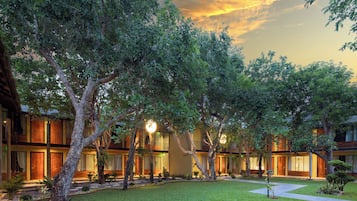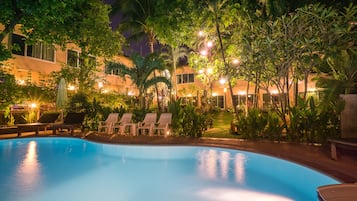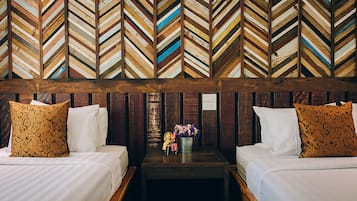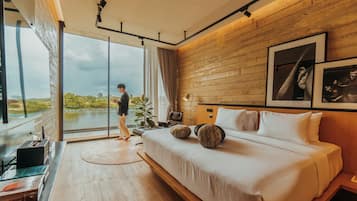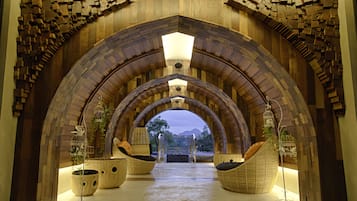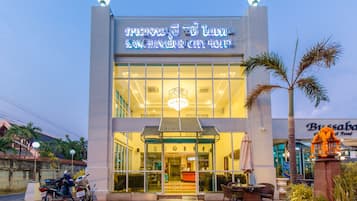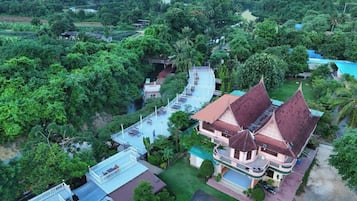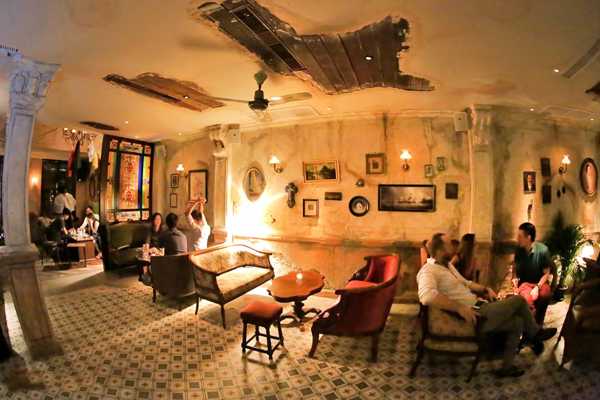The temples and shrines of Kanchanaburi offer a tranquil, contemplative space to disconnect from the stress of modern-day living. While the Thai city is best known for its grim wartime history, Kanchanaburi clings firmly to its age-old cultural roots.
Whether you’re an avid Buddhist pilgrim or travelling architecture buff, the town – and its surroundings – boasts a broad range of religious sites to explore. From subterranean cave temples to floating shrines, scores of sacred sanctuaries are peppered throughout Kanchanaburi. We’re covering the most interesting options in this list.
- 1
Wat Tham Suea
The most impressive shrine in the region

- Historie
- Fotografering
Wat Tham Suea is the region’s top shrine and a worthy pitstop for even the most templed-out traveller. Located 12 km southeast of town, the site is famous for its enormous bronze Buddha statue. The gigantic effigy stands 18 metres tall and commands sweeping views of the rice-paddy-strewn countryside.
If you don’t fancy climbing the colourful, Naga-flanked staircase, a cheap cable car can whisk you to the top. While you’re there, pop into the adjacent Chinese-style Wat Tham Khao Noi and note the contrast in architectural style. Wat Tham Suea is known as the “Tiger Temple” because big cats used to inhabit its caves. But don’t worry; they’ve since moved on.
Beliggenhet: Muang Chum, Tha Muang District, Kanchanaburi 71110, Thailand
Åpent: Daily from 8 am to 5 pm
Kart - 2
Wat Tham Pu Wa
A stunning Khmer-style temple

- Historie
- Fotografering
The Khmer-style Wat Tham Pu Wa is a hit for its intricate pink sandstone shrine and stalactite-studded cave. The shrine shows influences from the Lupbari architectural style, including ornate carvings of Buddha and other religious figures. Look for the seated sandstone Buddha, who sits surrounded by lush manicured gardens.
Throughout its extensive, 2-storey cave, you’ll find a wide array of gilded Buddhist statues. Find the Chinese astrological signs and make a prayer in front of your birth-year animal. Friendly local monks are happy to practice their English with foreign travellers – the site doubles as a meditation retreat.
Beliggenhet: Nong Ya, Mueang Kanchanaburi District, Kanchanaburi 71000, Thailand
Åpent: Daily from 8 am to 6 pm
Kart - 3
Wat Ban Tham
A mountainous cave temple with sweeping rural views

- Historie
- Fotografering
Wat Ban Tham is also known as the “Dragon Head Cave Temple” for its entrance resembling the mythical beast’s mouth. Located on the river bank right outside town, travellers can enjoy sweeping vistas from its hilltop. But be warned, you’ll need to scale 900 steps to get there. Toddlers and the elderly should give this one a miss.
A network of mountain caves hosts various religious artefacts, from statues to murals and technicoloured ribbons. Keep an eye out for the shrine paying homage to the legendary hermit Ruesi. And at the cavernous Luang Por Yai Chinnaraj shrine, a local monk offers blessings to passersby.
Beliggenhet: Khao Noi, Tha Muang District, Kanchanaburi 71110, Thailand
Åpent: Daily from 7.30 am to 5 pm
Kart - 4
Wat Thewa Sangkharam
An inner-city temple with a floating night market

- Mat
- Historie
- Fotografering
Wat Thewa Sangkharam sits smack bang in the centre of town – there’s no need to leave Kanchanaburi to see this sacred site. While it’s not the most visually unique temple around, its convenient (and scenic) riverfront location attracts a devout local crowd. The royal temple honours a former Thai patriarch, who you can learn about in the attached museum.
The temple puts on a floating night market on Friday evenings, where locals flock to feast on cut-price treats. This authentic, uncrowded affair gives travellers a taste of Thai culinary life. Keen to get off the beaten track? Almost all temple and market visitors are Thai.
Beliggenhet: 2GGG+WJ2, Ban Nuea, Mueang Kanchanaburi District, Kanchanaburi 71000, Thailand
Telefonnummer: +66 (0)34 511 216
Kart - 5
Wat Chai Chumphon Chana Songkhram
A unique boat-shaped shrine and former crematorium

- Historie
- Fotografering
Wat Chai Chumphon Chana Songkhram is best known for its life-sized statue of a mythical angel boat. The enormous gilded construction features an intricate Thai-style pagoda drawn by a man on horseback galloping through the waves. You can climb a small staircase to admire its ornate carvings up close.
The boat originally served as the temple’s crematorium for community funeral ceremonies. Various other smaller shrines lie scattered throughout the site. Pop into the small hall enshrining a genuine Buddha footprint (or so the story says).
Beliggenhet: Ban Tai, Mueang Kanchanaburi District, Kanchanaburi 71000, Thailand
Telefonnummer: +66 (0)34 620 926
Kart - 6
Wat Tham Khiritham
A community-focused temple popular with the locals

- Historie
- Fotografering
Wat Tham Khiritham is a popular community-orientated shrine outside the city of Kanchanaburi. The expansive, open-air site attracts scores of local visitors each day who come to pay their respects to its 28 standing Buddha statues. Swirling stone naga (half-human, half-serpent beings) sliver through the grounds, and there’s a nearby cave temple to explore.
This modern, custom-built temple packs out on Sundays and religious holidays. Nonetheless, a few foreign tourists brave the rough roads to get there. It’s located near Wat Tham Pu Wa.
Beliggenhet: Nong Ya, Mueang Kanchanaburi District, Kanchanaburi 71000, Thailand
Kart - 7
Wat Tham Khao Pun
An extensive cave temple and former military hospital

- Historie
- Fotografering
Wat Tham Khao Pun is a labyrinth-like maze of subterranean caves filled with glimmering Buddhist effigies. This intriguing cave temple has 9 chambers to explore, each interconnected by twisted limestone passageways. You’ll need to duck and squeeze to get through some sections, but that’s all part of the fun.
The Japanese Army ran an underground military hospital in the caves during the Second World War – look for the white painted chambers near the entrance. You’ll also find a small POW museum in a replica bamboo barracks. On the way back, climb to the hilltop stupa for sweeping river views.
Beliggenhet: Nong Ya, Mueang Kanchanaburi District, Kanchanaburi 71000, Thailand
Åpent: Monday–Saturday from 9 am to 7.30 pm, Sunday from 7.30 am to midnight
Telefonnummer: +66 (0)82 549 7752
- 8
Wat Tham Mangkornthong
A cavernous temple with gravity-defying floating nuns

- Historie
- Fotografering
Wat Tham Mangkornthong is a spectacular hilltop temple known for its floating nun shows. Like many regional temples, this centuries-old shine resides in a natural limestone cave. Access is via a steep, 95-step staircase flanked by Naga handrails and thick vegetation.
Although there’s a solid selection of small shrines and religious exhibits, the floating nuns are the true star of the show. These buoyant elderly devotees meditate while floating in a clear plunge pool, remaining motionless with their mouths millimetres above the surface. Spectators are welcome to gather around and watch.
Beliggenhet: Ko Samrong, Mueang Kanchanaburi District, Kanchanaburi 71000, Thailand
Telefonnummer: +66 (0)98 852 0551
Kart - 9
San Lak Mueang
The City Pillar Shrine of Kanchanaburi

- Historie
- Fotografering
San Lak Mueang is Kanchanaburi’s city pillar shrine. Known as lak mueang, city pillar shrines reside in most Thai urban centres. These interesting inner-city temples were constructed upon founding a new town to house Chao Pho Lak Mueang, or the city spirit diety.
Kanchanaburi’s San Lak Mueang sits in the middle of Lak Mueang Road, a central location that makes it a well-known local landmark. It’s unique from other Lak Mueang due to its Chinese-style pavilion, which comes from the city’s age-old Chinese roots.
Beliggenhet: Lak Mueang, Pak Phraek, Mueang Kanchanaburi District, Kanchanaburi 71000, Thailand
Kart - 10
Wat Thaworn Wararam
A distinct Vietnamese shrine and grim mass burial ground

- Historie
- Fotografering
If Wat Thaworn Wararam looks a little different to other temples in Kanchanaburi, that’s due to its distinct Vietnamese design. In fact, the colourful inner-city stupa is locally known as Wat Yuan, a Thai slang term for “Vietnamese Temple”. Its namesake stems from Vietnamese refugees who constructed the site in the mid-19th century.
The pastel-coloured triple-tiered stupa sits among verdant well-manicured gardens. But the peaceful picture hides the scars of a dark past. An obelisk marks the spot where thousands of slain slaves were buried after the completion of the Thai-Burma Railway.
Telefonnummer: +66 (0)34 511 521
Kart






